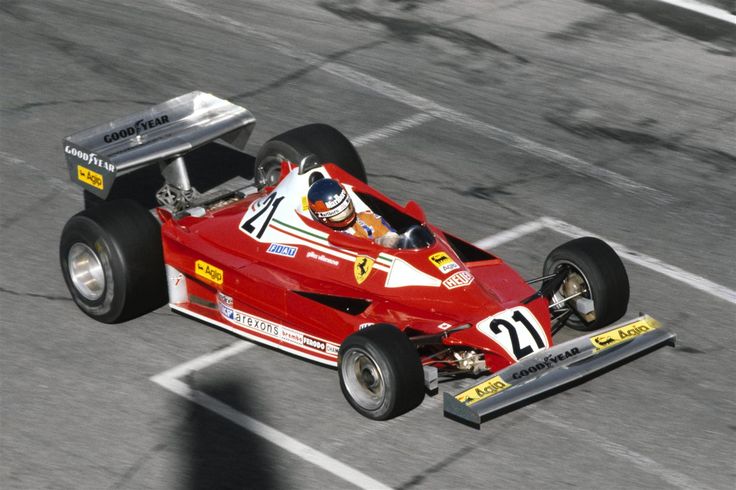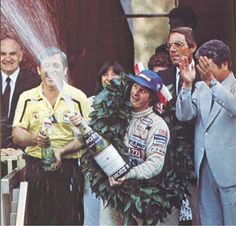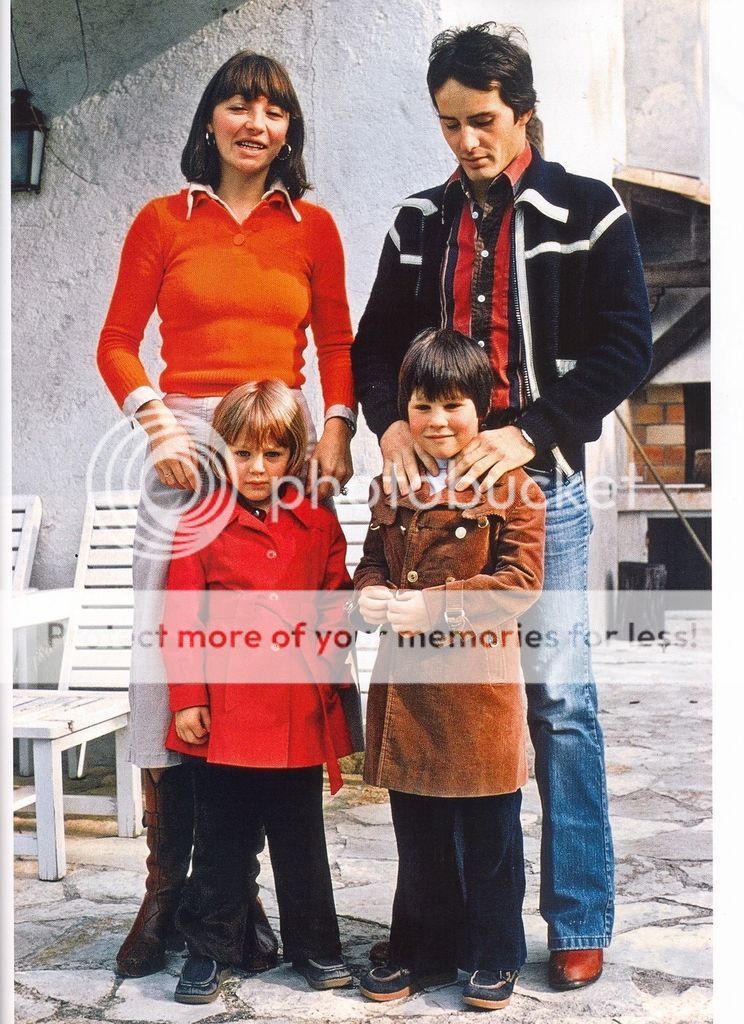What can be said about Gilles Villeneuve that hasn't already been said? Of his generation, he was probably the most exciting F1 driver on the grid but with a humanity and a desire for fairness few could match.
Born in 1950, Gilles learnt the art of car control in snow mobile racing. I found this quote from him on the skills he learned driving those machines: "Every winter, you would reckon on three or four big spills - and I'm talking about being thrown on to the ice at 100 mph. Those things used to slide a lot, which taught me a great deal about control. And the visibility was terrible! Unless you were leading, you could see nothing, with all the snow blowing about. Good for the reactions - and it stopped me having any worries about racing in the rain." - See more at: http://www.grandprixhistory.org/vill_bio.htm#sthash.FOGhOSLd.dpuf
In the Quebec regional Formula Ford series, with a privately entered two year old car, Villeneuve won seven of the ten races he entered. From there he graduated Formula Atlantic and won his first race in 1975. For 1976 he won all but one of the races in that series. The race me missed out on the team couldn't enter as they had run out of money. Gilles won the championship again in 1977 and, after beating drivers such as James Hunt in a non-championship Formula Atlantic race in 1976 was offered a drive in a third car by McLaren at the British Grand Prix.

Gilles put the ageing M23 in between Hunt and Mass's M26 cars on the grid but ended 11th due to problems with the temperature gauge. Despite having impressed on his F1 debut there were no more drives in an F1 McLaren in 1977 but Gilles did have two races for Ferrari In Canada and Japan. Villeneuve's arrival is rumoured to be one of the reasons Niki Lauda waled out on Ferrari at the Canadian GP in 1977 but this is probably more about hindsight than reality as there were many problems between Laud and the Scuderia by this time.
Gilles debut in the 312 T2 netted an 11th place in Canada. In Japan, an incident with Ronnie Peterson saw the Ferrari become airborne landing on a group of spectators who were watching from a prohibited area, killing one and injuring ten of them. No blame for the incident was attached to Villeneuve.

1978 saw a full time contract with Ferrari as second driver to Carlos Reutemann. It's strange to think now that there were calls for Gilles to be replaced at Ferrari at the start of 1978 but Ferrari persisted with him and results improved. In Canada, Gilles became first and only Canadian driver to win his home Grand Prix when Jean -Pierre Jarier's Lotus retired with engine problems.
In 1979 Reutemann left for Lotus and Jody Scheckter arrived as team leader. This season will be rememberer for many reasons; Sheckter was World Champion despite the obvious problems of the 312 T4 compared to the Ligier and Williams wing cars, Villeneuve's desire to see his team mate become World Champion which was typified by him keeping station behind Scheckter at Monza despite being significantly faster, the wheel banging end to the French Grand Prix where Villeneuve and Rene Arnoux battled for second place and Gilles' car wrecking return to the pits at the Dutch Grand Prix, presumably as he didn't want to walk back.
Villeneuve won 3 races, in South Africa, Long Beach and the final race of the season at Watkins Glen. The stand out moment, ignoring the wins and his second place in the drivers championship, was in a wet Friday practice at Watkins Glen where Gilles lapped the sodden track somewhere between 9 and 11 seconds faster than Jody Sheckter who thought he had put in a blinding lap!

1980 showed just how far behind the flat 12 Ferrari's were in the days of ground effect and both Schecker and Villeneuve had a season to forget. Jody managed just 2 points through the season and Gilles 6, The high point was the first run for the Ferrari 126C at Imola as the Scuderia took it's first steps into the world of turbo power.
With Sheckter retired Didier Pironi joined Villeneuve at Ferrari. The Ferrari engine had a huge amount of power but it tended to arrive all at once and only a driver with the feel that Villeneuve had could make any use of it. At the circuit where "a turbo car will never win", Monaco, Nelson PIquet led from pole only to crash out. Alan Jones took over the lead but fuel feed problems saw him retire which left Villeneuve at the front. He won the race. He then won the next race in Spain, using the turbo power to keep a train of cars behind him down the straights, only for them all to concertina up at the twisty bits. If you haven't see it, find the closing laps of this race on You Tube to watch a master class in how to win a Grand Prix in a car that shouldn't.

A third in Canada, in the rain, at the end of the season was equally astonishing as Gilles broke the front wing early in the race and drove for some laps with the wing obscuring his vision before it finally fell off.

For 1982 Ferrari Harvey Postlethwaite led the design of the rather beautiful 126C2 and with this Villeneuve and Pironi had a chassis to match the power of the Ferrari turbo engine. The season started poorly for Villeneuve with retirements in South Africa and Brazil and a disqualification in Long Beach as Ferrari "tested" the rules with a double width rear wing. At the next race, in Imola, after the two Renaults had retired the Tifosi were left with their beloved red cars running round in first and second. Villeneuve and Pironi were given an order to slow to preserve their engines and ensure they had enough fuel to make it to the end of the race. As a team player Villeneuve did as instructed and then Pironi ducked past. Villeneuve went back past him a few laps later, assuming Didier was putting on a show for the crowd but on the final lap Pironi went back past and took the win. To describe Villeneuve as furious would be a bit of an understatement. The Ferrari team had to cajole him on to the podium and watch Pironi celebrating the race he should have won. The two men never spoke again.

At the next race, at Zolder in Belgium, the resentment between the two was even higher and Gilles was out to prove he was the better driver. This was the days of qualifying tyres where you got one fast lap before the rubber was destroyed. Behind Pironi in the final qualifying session Villeneuve went out on a used set of tyres to try and beat the Frenchman's time, he never returned. With only one lap to set a time it was all or nothing and Villeneuve came across the slow moving March of Jochen Mass during his lap, hit the cars rear tyre and was launched off the road. As the car somersaulted across the track Gilles was thrown from the car. He died that evening, kept alive on life support until his wife arrived.
I recall Jeremy Clarkson muttering something about his hero being Gilles Villeneuve until he started watching some video's of Ayrton Senna when the film about Senna's life was being made. The difference for me between the two men was the level of humanity. Gilles didn't either want or need to destroy other drivers mentally, he would simply drive as fast as he could all the time but if the team told him his team mate needed to win to take the title he would hold station. After all, with all that talent and desire he would be a World Champion one day. Sadly not.
Villenueve only won six Grands Prix but his legacy and the memory of those who saw him compete either at the circuit or on TV far out weighs the results he achieved in his tragically short career. His style may not have suited the fragile F1 cars of the early 80's but it was his style and he wasn't going to change.

Gilles Villeneuve 1950 - 1982
Born in 1950, Gilles learnt the art of car control in snow mobile racing. I found this quote from him on the skills he learned driving those machines: "Every winter, you would reckon on three or four big spills - and I'm talking about being thrown on to the ice at 100 mph. Those things used to slide a lot, which taught me a great deal about control. And the visibility was terrible! Unless you were leading, you could see nothing, with all the snow blowing about. Good for the reactions - and it stopped me having any worries about racing in the rain." - See more at: http://www.grandprixhistory.org/vill_bio.htm#sthash.FOGhOSLd.dpuf
In the Quebec regional Formula Ford series, with a privately entered two year old car, Villeneuve won seven of the ten races he entered. From there he graduated Formula Atlantic and won his first race in 1975. For 1976 he won all but one of the races in that series. The race me missed out on the team couldn't enter as they had run out of money. Gilles won the championship again in 1977 and, after beating drivers such as James Hunt in a non-championship Formula Atlantic race in 1976 was offered a drive in a third car by McLaren at the British Grand Prix.

Gilles put the ageing M23 in between Hunt and Mass's M26 cars on the grid but ended 11th due to problems with the temperature gauge. Despite having impressed on his F1 debut there were no more drives in an F1 McLaren in 1977 but Gilles did have two races for Ferrari In Canada and Japan. Villeneuve's arrival is rumoured to be one of the reasons Niki Lauda waled out on Ferrari at the Canadian GP in 1977 but this is probably more about hindsight than reality as there were many problems between Laud and the Scuderia by this time.
Gilles debut in the 312 T2 netted an 11th place in Canada. In Japan, an incident with Ronnie Peterson saw the Ferrari become airborne landing on a group of spectators who were watching from a prohibited area, killing one and injuring ten of them. No blame for the incident was attached to Villeneuve.

1978 saw a full time contract with Ferrari as second driver to Carlos Reutemann. It's strange to think now that there were calls for Gilles to be replaced at Ferrari at the start of 1978 but Ferrari persisted with him and results improved. In Canada, Gilles became first and only Canadian driver to win his home Grand Prix when Jean -Pierre Jarier's Lotus retired with engine problems.
In 1979 Reutemann left for Lotus and Jody Scheckter arrived as team leader. This season will be rememberer for many reasons; Sheckter was World Champion despite the obvious problems of the 312 T4 compared to the Ligier and Williams wing cars, Villeneuve's desire to see his team mate become World Champion which was typified by him keeping station behind Scheckter at Monza despite being significantly faster, the wheel banging end to the French Grand Prix where Villeneuve and Rene Arnoux battled for second place and Gilles' car wrecking return to the pits at the Dutch Grand Prix, presumably as he didn't want to walk back.
Villeneuve won 3 races, in South Africa, Long Beach and the final race of the season at Watkins Glen. The stand out moment, ignoring the wins and his second place in the drivers championship, was in a wet Friday practice at Watkins Glen where Gilles lapped the sodden track somewhere between 9 and 11 seconds faster than Jody Sheckter who thought he had put in a blinding lap!

1980 showed just how far behind the flat 12 Ferrari's were in the days of ground effect and both Schecker and Villeneuve had a season to forget. Jody managed just 2 points through the season and Gilles 6, The high point was the first run for the Ferrari 126C at Imola as the Scuderia took it's first steps into the world of turbo power.
With Sheckter retired Didier Pironi joined Villeneuve at Ferrari. The Ferrari engine had a huge amount of power but it tended to arrive all at once and only a driver with the feel that Villeneuve had could make any use of it. At the circuit where "a turbo car will never win", Monaco, Nelson PIquet led from pole only to crash out. Alan Jones took over the lead but fuel feed problems saw him retire which left Villeneuve at the front. He won the race. He then won the next race in Spain, using the turbo power to keep a train of cars behind him down the straights, only for them all to concertina up at the twisty bits. If you haven't see it, find the closing laps of this race on You Tube to watch a master class in how to win a Grand Prix in a car that shouldn't.

A third in Canada, in the rain, at the end of the season was equally astonishing as Gilles broke the front wing early in the race and drove for some laps with the wing obscuring his vision before it finally fell off.

For 1982 Ferrari Harvey Postlethwaite led the design of the rather beautiful 126C2 and with this Villeneuve and Pironi had a chassis to match the power of the Ferrari turbo engine. The season started poorly for Villeneuve with retirements in South Africa and Brazil and a disqualification in Long Beach as Ferrari "tested" the rules with a double width rear wing. At the next race, in Imola, after the two Renaults had retired the Tifosi were left with their beloved red cars running round in first and second. Villeneuve and Pironi were given an order to slow to preserve their engines and ensure they had enough fuel to make it to the end of the race. As a team player Villeneuve did as instructed and then Pironi ducked past. Villeneuve went back past him a few laps later, assuming Didier was putting on a show for the crowd but on the final lap Pironi went back past and took the win. To describe Villeneuve as furious would be a bit of an understatement. The Ferrari team had to cajole him on to the podium and watch Pironi celebrating the race he should have won. The two men never spoke again.

At the next race, at Zolder in Belgium, the resentment between the two was even higher and Gilles was out to prove he was the better driver. This was the days of qualifying tyres where you got one fast lap before the rubber was destroyed. Behind Pironi in the final qualifying session Villeneuve went out on a used set of tyres to try and beat the Frenchman's time, he never returned. With only one lap to set a time it was all or nothing and Villeneuve came across the slow moving March of Jochen Mass during his lap, hit the cars rear tyre and was launched off the road. As the car somersaulted across the track Gilles was thrown from the car. He died that evening, kept alive on life support until his wife arrived.
I recall Jeremy Clarkson muttering something about his hero being Gilles Villeneuve until he started watching some video's of Ayrton Senna when the film about Senna's life was being made. The difference for me between the two men was the level of humanity. Gilles didn't either want or need to destroy other drivers mentally, he would simply drive as fast as he could all the time but if the team told him his team mate needed to win to take the title he would hold station. After all, with all that talent and desire he would be a World Champion one day. Sadly not.
Villenueve only won six Grands Prix but his legacy and the memory of those who saw him compete either at the circuit or on TV far out weighs the results he achieved in his tragically short career. His style may not have suited the fragile F1 cars of the early 80's but it was his style and he wasn't going to change.

Gilles Villeneuve 1950 - 1982
